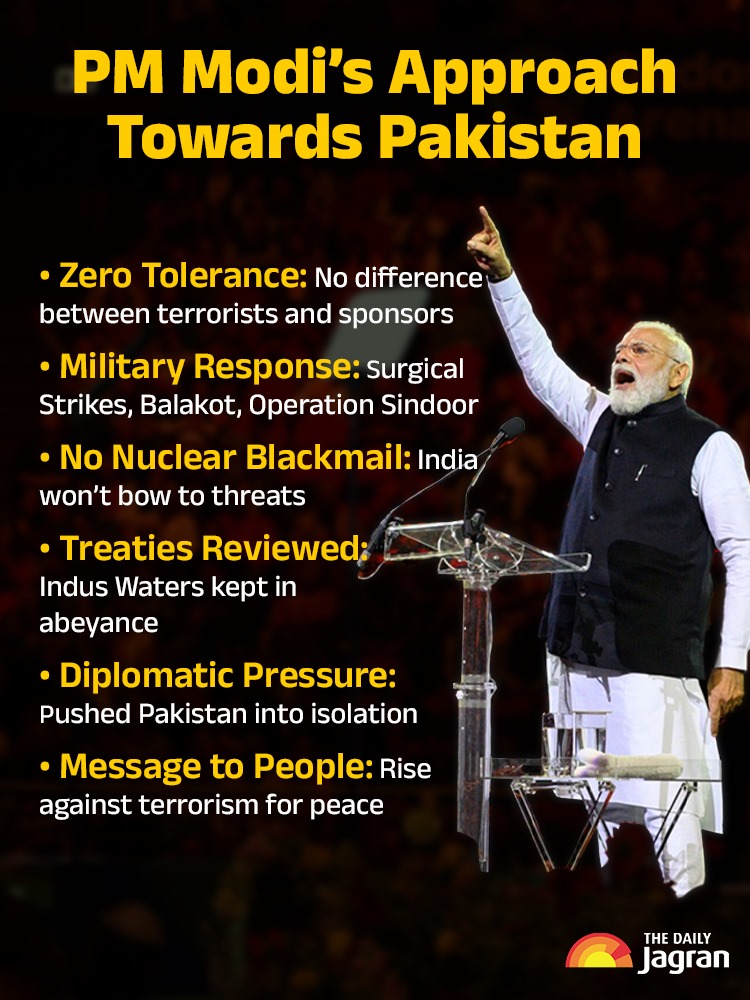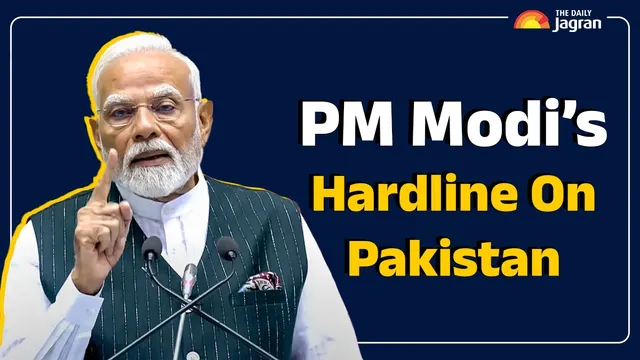- By News Desk
- Wed, 17 Sep 2025 08:28 AM (IST)
- Source:JND
PM Modi's 75th Birthday: As Prime Minister Narendra Modi turns 75, one of the defining characteristics of his tenure comes to the fore, his uncompromising, hard-line approach towards Pakistan. Over the past decade, PM Modi has broken away from the legacy of cautious diplomacy and embraced a strategy built on deterrence, strength, and direct messaging. Since the beginning of his rule, PM Modi has emphasised that India's patience with cross-border terrorism had been exhausted. His utterances and actions since then have characterised a radical break from the policies of his predecessors.
Departure From The Past
India's policy towards Pakistan was, for decades, framed in terms of brotherhood and reconciliation. In 1957, then Prime Minister Jawaharlal Nehru referred to Pakistan as India's "heart and arms," calling the nation inseparable despite provocations. That philosophy of brotherhood guided decisions such as the Indus Waters Treaty (1960) and concessions made under the Noon-Nehru Pact (1958). Even Indira Gandhi, following India's crushing 1971 victory, released more than 90,000 Pakistani prisoners of war without demanding a settlement of Kashmir, evincing continuity of that mindset.
Successive governments largely avoided open confrontation. Even after the 2008 Mumbai attacks, then Prime Minister Manmohan Singh refrained from directly naming Pakistan in his Independence Day speech.
PM Modi’s era has been a turning point. His words and actions have redefined how India responds to its western neighbour. He has shed what he calls “misplaced sentimentality,” replacing it with the language of deterrence, military action, and strategic pressure.
• Tough zero tolerance for terrorism: PM Modi has indicated India won't differentiate between the terrorists and their backers. Terror outfits and people who shelter them are dealt as one.
• Authoritative counter-attacks: Right from the surgical strikes of 2016 through Balakot air strikes in 2019 to the latest Operation Sindoor, India has demonstrated that it will not hesitate to cross lines when attacked.
• Spurning nuclear blackmail: PM Modi has repeatedly emphasised that India will not yield to Pakistan's nuclear blackmail. "Blood and water will not flow together," he asserted, connecting security with the Indus Waters Treaty.
• Re-examination of previous treaties: Post-big terror attacks, PM Modi's administration kept the Indus Waters Treaty "in abeyance," indicating that agreements cannot be at the expense of national interest.
• Diplomatic isolation: PM Modi-led India has made an effort to bring Pakistan's track record of harbouring terror groups to the forefront, having Islamabad cornered economically and politically.
• Message to Pakistani citizens: Being tough with the government while encouraging the people of Pakistan to shun terrorism, PM Modi has repeatedly invited them to turn away from terror and accept a path that will lead them to peace and prosperity.

Words That Resonate
His fiery comments tend to reflect this hardline stance. Following the Pahalgam attack, speaking at a rally in Bhuj, he declared, "Live peacefully and eat your bread, or else my bullet is ready." It was rhetoric, but a reflection of just how far India's position has shifted from times of restraint.
ALSO READ: PM Modi’s 75th Birthday: The Leader Who Redefined India’s Governance And Global Image
Drawing attention to what he called the Indus Waters Treaty injustice, PM Modi stated India's entitlement to water rests only with its farmers and no compromise will be made on national interests. "The Indus Waters Treaty was an injustice to Indians. India's rivers were supplying water to the enemy nation, while our own farmers were left without it. No more," he asserted.
So If Nehru’s era was defined by fraternity and restraint, PM Modi’s era has been marked by deterrence and resolve. His words and actions have made it clear that peace is possible, but only when Pakistan decisively distances itself from terrorism. On his 75th birthday, this uncompromising stance stands out as one of the defining features of his leadership, a reflection of both his personal conviction and the nation’s shifting expectations.
Approach Towards Chinese Aggression
• Nehru lived in an imagined world, far removed from the harsh realities of a nation surrounded by imperialist neighbours.
• His nepotism showed in his appointments, making his sister, Vijaya Lakshmi Pandit, the ambassador to China and the Soviet Union, and his interference in the armed forces by handpicking a general before the China war and appointing a defence minister who was a known Communist sympathiser. These decisions contributed to India's humiliating defeat in 1962.
• Nehru neglected the Army and ignored the urgent need for a well-equipped force, which ultimately led to the disaster.
• His hesitation to use the Army was evident even earlier. When it came to liberating Goa from Portuguese rule, Nehru stubbornly opposed military intervention for years after Independence.
• His callous attitude towards the loss of Indian territory was summed up in his infamous remark in Parliament about Aksai Chin: "Not a blade of grass grows there."
• When Chinese troops advanced, Nehru even expressed despair over Assam, saying, "My heart goes out to the people of Assam," instead of showing resolve to protect the state.
• After the crushing defeat, Nehru's 1963 Independence Day speech failed to even acknowledge, let alone honour, the valour and sacrifice of Indian soldiers. In stark contrast, PM Narendra Modi pays rich tribute to the soldiers who gave their lives in Galwan.
• Under PM Modi's leadership, India has fast-tracked the development of border infrastructure, narrowing the gap with China and strengthening our defence preparedness.

